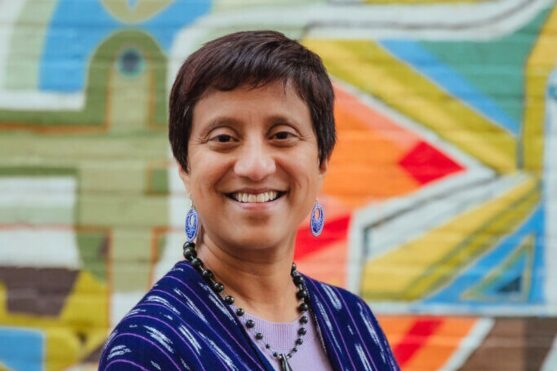How do we shift evaluation from a ‘reporting’ to a learning lens?

Brenda Solorzano is a leading changemaker in trust-based philanthropy. As the CEO of the Headwaters Foundation in Montana, US, she works side-by-side with communities there to improve their health. Brenda had an insightful and candid conversation with our LEAF Network (previously Phil Eval Network) to share her ideas on how evaluation can be reframed to achieve learning and change through a trust-based approach. Here, she discusses how this can improve measurement, evaluation, learning and impact for funders and communities alike.
Evaluation for learning in trust-based philanthropy
A new approach to evaluation is rising in philanthropy – one that is rooted in trust, equity and learning for impact. At Headwaters Foundation, our evaluation process puts learning together at its centre – positioning grantees and the foundation as true partners. We evaluate for three purposes:
- Accountability to the communities we serve
- Learning about progress towards the outcomes defined by grantee partners
- Tracking long-term health metrics over time to see if the strategies we invest in are contributing to positive trends.
Measuring what matters – and to who
Before I dive into a trust-based approach to evaluation, let me share some of the underlying assumptions that fuel philanthropy’s antiquated approach to evaluation. While some funders in Australia are working to improve this, many currently track data with a similarly mainstream approach because they believe:
- The main audience for evaluation is board members and leaders who want to see ‘proof’ of impact
- Traditional Return on Investment (ROI) approaches from the business community apply
- Foundation dollars alone lead to positive social impact as written into grants
- Evaluation and learning can be defined narrowly, based on white-dominant frames around impact, such as funder-driven metrics
- Grantee reporting is, and should remain, a one-way stream.
This way of thinking about evaluation reinforces funders as the central figure. It sets up short-term metrics that allow funders to pat themselves on the back, rather than see, and actually address, the real challenges communities face – including the time they waste unnecessarily reporting to funders. It also fails to capture learnings that could be useful to grantees, communities and foundations.
These traditional approaches can also ignore very real discrepancies between groups with resources to put toward grant reporting, and those without – which often run along lines of race, gender, gender identity, class and other social factors. Smaller groups with less support tend to have less capacity to track and report their impact along traditional business models.
When grantee partners can report back, they tend to share what they believe funders will want to hear, and staff pass along information they think boards will want to hear.
When I joined Headwaters Foundation it was a new foundation, and I was tasked with creating its structures from the ground up. When it came to evaluation, my work was about listening to communities and acting on what I was learning, not making grantees jump through structural hoops or report back in traditional ways. A new way of thinking about learning and evaluation began to take shape that is rooted in three pillars:
- Learning for accountability
Positions accountability – to ourselves and to our grantee partners – as core work:
- Are we showing up authentically?
- Are we living our values?
- What do we do when we realise we’re showing up poorly?
Learning for accountability recognises one of the few areas that funders can truly have influence over – how we show up. These questions should be part of every evaluation approach yet are part of almost none.
- Learning for decision-making
Understanding that grantee partners, not funders, know how to best advance their work is key. By listening to this expertise, funders play a different and more impactful role in the nonprofit-funder ecosystem:
- Funders do not listen for the stories we’ve grown accustomed to asking for – instead, we ask grantee partners to truly shape what the work looks like
- Partners tell us what they need to succeed, what’s working and what’s not
- How we as funders are supporting our partners in meeting their goals.
- Learning for long-term impact.
Change doesn’t happen at the pace of grantmaking. Rather than focus on the narrow view of a single grant, evaluation must consider a long view, across ecosystems:
- We must assess change over the course of years and decades, not one-to-two-year chunks
- We must engage wider, cumulative community efforts, not the success of a single organisation’s goals.
Foundations have necessary cultural work to do before this emergent approach to learning and evaluation can begin, such as:
- Shedding old notions and embracing a new, more vulnerable philosophy
- Recognising that this new approach changes the role of funders and proactively works to shift power.
How we do it at Headwaters Foundation
Headwaters Foundation has conducted an iterative annual Learning and Evaluation Data Book for four years now. It is an example of how our team has brought a trust-based learning approach to life. Comprised of oral and written reporting data, internal goal-tracking metrics and stories of lessons learned, this publicly available tool helps us determine what is working, what isn’t, and how we can adapt to better serve partners and communities. The learning book also helps track the big-picture impact of our work and funded projects and pinpoints questions to guide future learning.
Moving to impact, learning, and evaluation
It will take time and work, but I believe it will get all of us – funders, grantees and communities alike – to a place of more honesty, greater impact and community-informed transformation.
Evaluation for Learning in Trust Based Philanthropy with Brenda Solarzano is available to view online.